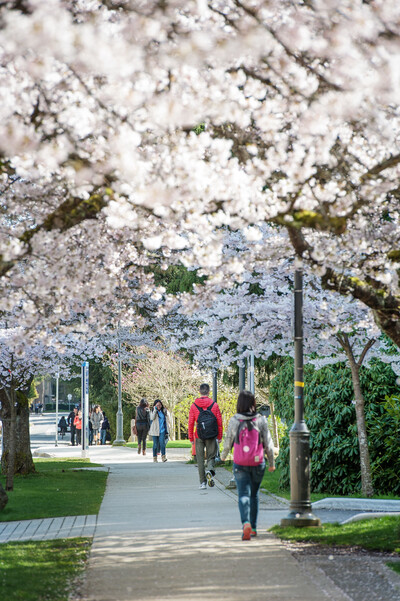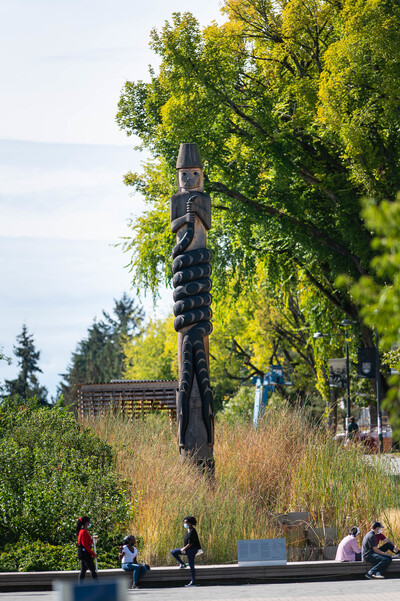
Executive Brief
Dean, Faculty of Education
The University of British Columbia
Mission and Values

Our Mission
To advance the role of education in the well-being of people and communities
Our mission statement represents the collaborative thought and effort of many members of our Faculty. As we grow and change as a community, our mission needs to grow as well. Therefore, we view this statement as a living one, evolving with our community and never final.
Who we are
A diverse community of scholars, educators, staff, and students committed to improving teaching and learning through innovative and inquiry-driven programs, research, reflection, and critique in partnership with its communities.
We are committed to
The initial and continuing education of teachers and related professionals in the settings in which they work.
Graduate preparation and practitioners.
The cultivation of close connections among educational theory, policy, and practice.
Our destination
To be among the world leaders as scholars, staff, and students involved in the study and practice of education, educational issues, and human kinetics.
To advance public understanding of teaching and learning and to raise public awareness of and access to lifelong learning.

Our Values
Academic Freedom
The Faculty of Education, in its activities and in this Mission Statement, is governed by the principles of academic freedom as expressed by the University of British Columbia. The rights and privileges of academic freedom apply to the University's primary functions, namely, instruction and the pursuit of knowledge. The Faculty of Education asserts that ethical conduct is a corollary of academic freedom and that the responsibilities outlined in this Mission are concomitant with the rights and privileges described.
Ethics and Responsibilities
We acknowledge that our responsibilities as educators and researchers go beyond local, provincial, and national borders. We seek to inform our research and practices by consideration of issues such as, inter alia, poverty, minority rights, inequality, and social justice.
Within the context of the policies and guidelines of The University of British Columbia, we ask our members to be reflective, ethical, and self-critical in recognizing the complexities of educational research, multiple perspectives, and alternative interpretations.
We value social and environmental responsibility as individuals and as an institution.
We require our members, including faculty, sessional faculty, staff, and students, to aspire to the highest ethical standards in their professional conduct.
Internationalism
Participate in an international community of learning by developing connections with institutions, scholars, and students in the creation and sharing of knowledge. Act as a forum for debate, critical discussion, and reflection on problems for our local, national, and international partners.
Partnerships
Educate, inform, and partner with the multiple constituencies who have interests in teaching and learning throughout life and throughout society.
Form rewarding and ethical relationships with governments, agencies, businesses, labour, institutions, and individuals for the purposes of enhancing knowledge, programs, and technologies that will benefit learners.
Model partnership within our own community by promoting and enhancing integrated approaches across the Faculty and across the University while maintaining the distinctive identities of our units.
People and Community
Govern ourselves in a participatory, inclusive, and transparent fashion that fosters open communication, fair decision-making, and collaboration among units.
Attract, retain, and support outstanding faculty, staff, and students.
Increase diversity among students, staff, and faculty.
Provide students with an intellectually rigorous education through programs that are innovative and interdisciplinary and that prepare them for the challenges of their profession or for further study.
Provide the resources and conditions that will allow students, staff, and faculty to fulfil their academic and professional goals.
Value the contributions of all members of the Faculty community in developing and delivering programs and services.
We value the contributions of all members of our Faculty, including faculty, sessional faculty, staff, and students. We are committed to providing them with the best possible environment for working and learning, an environment that encourages collegiality, support, and respect and that is free from discrimination and harassment.
We value our ties with the students, schools, teachers, families, communities, and agencies concerned with education in British Columbia; local, provincial, national, and international groups and persons who have a stake in education; the academic community; and our alumni and emeriti.
Profession and Scholarship
Improve the practices of education through innovation, inquiry, program development, critique, debate, and reflection, within our own Faculty and within our practice communities.
Conduct innovative research on the processes of education, generating knowledge not only for the sake of advancing theory, but also for the purposes of applying it in our practices and sharing it with practitioners, policymakers, scholars, and the community at large.
Develop knowledge, tools, perspectives, support services, and programs that are helpful to communities at large. Attract, nurture, graduate, and provide ongoing support to our students within and outside of school settings.
Professional Excellence
We seek to be leaders in developing the practices of education and in our commitment to the research, discussion, and thought that support these practices.
As educators and researchers, we value the ongoing pursuit and critique of excellence in teaching, leadership, innovation, and research.
Society
Raise public awareness of and support for education.
Engage public participation in life-span learning, workplace learning, and teaching and learning in the many contexts that exist outside the Faculty and outside schools.
Work with the community beyond the Faculty to define new directions for education in relation to equity, social justice, and other issues.
Promote awareness of the Faculty's contributions to education, as researchers and as educators, within the province, nationally, and internationally.
Technology
Understand, promote, develop, and research the use of technologies in society, particularly in the enhancement of teaching and learning in order to prepare our students to engage in an information-rich, technology-supported world.
Critique and shape the innovative use of technologies in developing teaching practice and new ways of learning within classrooms and in all other places where learning takes place.
Support the development of professional educators who will use technology to enhance learning in schools and communities.

